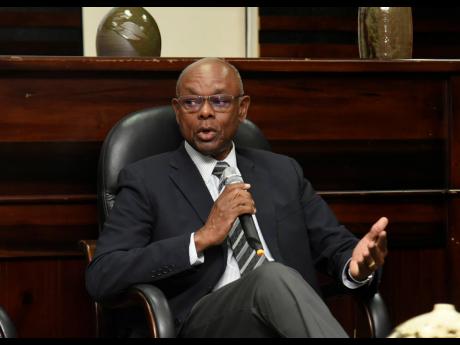Hylton highlights wish list on constitutional reform
King’s Counsel (KC) Michael Hylton has revealed some of the constitutional changes that he wishes to see the Constitutional Reform Committee (CRC) recommend to Cabinet to facilitate Jamaica’s smooth transition to Republican status, and which would reduce the power of the prime minister.
In March 2023, Prime Minister Andrew Holness announced the 15-member committee co-chaired by Minister of Legal and Constitutional Affairs Marlene Malahoo Forte and Ambassador Rocky Meade.
On Monday, Malahoo Forte announced that the committee had completed phase one of its work and would be submitting its report to Cabinet.
Addressing a Rotary Club of St Andrew weekly meeting on Tuesday, Hylton, as special guest, said the minister did not indicate what the report would say so he has to contend with a list of some changes he would like to see recommended, even though he knows they will not be on the list.
Hylton said one of his pet concerns was that there is too much power in the hands of the prime minister.
Hylton's wish list
Having a fixed election date
Hylton noted that election dates are almost totally in the discretion of the prime minister and, understandably, prime ministers schedule elections for times that are most politically advantageous to them.
“It seems to me that is an undesirable situation,” he said. “In the past some opposition leaders have promise that they would change this if elected and then not done so when they’re in office;”
Change to the appointment of Chief Justice and Appeal Court President
“There should be a change in my view, so that the Judicial Service Commission, instead of the prime minister, decides who should be appointed as the chief justice and the president of the Court of Appeal,” Hylton told the meeting.
“I mentioned earlier that the constitution now provides that this commission appoint judges of those courts, with two exceptions and, ironically, the two exceptions are the heads of each court. In my view, this is fundamentally wrong. The appointments to these positions ought not to be in the hands of the political directorate or, worse, in the hands of one person.”
Dual Citizenship Provision
“Citizens of non-Commonwealth countries are disqualified from sitting in the Parliament but not those of Commonwealth countries which in my view is a historical colonial anomaly that cannot be justified today,” Hylton put forward. According to him, there should either be a restriction on non-Jamaicans or no restrictions at all.
“I don’t see the justification for restriction based on whether it’s a Commonwealth country or not,” he stated.
Electoral and Integrity Commissions should be entrenched in Constitution
“Equally, if not more important, is the status of these two commissions (Electoral and Integrity). There is general agreement that these are critical institutions, that they play a very important role in our democracy. The difficulty is, those bodies exist and are governed by ordinary legislation and that means that the party in government can change their terms, change their structures or even repeal them and do away with them altogether and the only way to avoid that is to give them constitutional status on an entrenched basis. That’s something that has been discussed and recommended from time to time before (but has) not been done.”
Term Limits for Prime Ministers and DPPs
And while describing these two issues as “perhaps more controversial”, Hylton admitted to not feeling “that strongly” about term limits for prime ministers.
“But I think that it is something that ought to be done, establishing term limits for prime ministers. It’s been mooted, it’s been promised, it has not been done.”
Regarding the director of public prosecution (DPP), Hylton said: “Provide for fixed term or fixed retirement date for the DPP with no power to extend, as was done with the judges. The power to extend is a power that, like all powers, may lend itself to abuse and again I’m not speaking about any specific case.
But while advocating for these changes, Hylton more or less admitted that they will never happen - at least not in the foreseeable future.
“There is no consensus on these issues. There is consensus and there has been consensus for decades on moving from monarchial status to republic and that has not happened and so it’s very unlikely that those issues I just listed, on which there is, in most cases, no consensus, are likely to happen in the short term,” he surmised.

